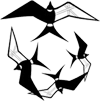![]() Poison Used to Kill Predators is the Biggest Threat to Vulture Populations
in Namibia
Poison Used to Kill Predators is the Biggest Threat to Vulture Populations
in Namibia
[New Era
– 1 September 2011]
Vultures have foraged across the African plains for hundreds of years with their populations fluctuating in response to natural events and food availability. However, over the past decades the populations of the seven vulture species that have been recorded in Namibia are in decline. All species are now conservation dependent and investigation into the population declines has proved that mostly avoidable human actions are responsible for vulture deaths.
Globally, the activities that are implicated in the decline of various vulture populations include; collision with or electrocution on power lines, disturbance at nest sites, harvesting of birds for traditional healing trade, some pharmaceuticals used in livestock farming, ingestion of lead bullets from animals killed by shooting and ingestion of poison from baits set to kill mammalian predators on farmlands. The most devastating of these activities for Namibia's vulture populations is the use of poison to kill predatory mammals on livestock farms.
When conflict exists between livestock and predators, the first consideration must be on management of livestock to prevent predation. A toolbox of tricks has been developed for farmers in Africa, Europe and the Americas to prevent predation. Poisoning predators, historically an approved lethal predator management method is no longer viewed as environmentally safe or ethically sound. Over many trials, it has been clearly proven to be a non-selective method of killing the primary victim and as the poison enters the food chain it has lethal consequences for secondary and even tertiary victims. Poisons pose a threat to the farmer, his family, his pets, the farm employees, their families and the environment in general. Namibians need also be aware of responsibilities beyond our borders. Meatco Namibia has created an excellent and invaluable export market for Namibian beef. Meatco therefore relies on all our farmers to be able to assure consumers of our full commitment to ethical farming and clean beef.
Looking at sections in relevant legislation, the Nature Conservation Ordinance, the Farm-feeds and Fertilizer Act and the Hazardous Substances Act, concerning poison, killing of wild animals and protection of livestock it is obvious that poison events that are being reported are often criminal on more than one account. One of the main reasons that these crimes continue is because of the lack of investigation of cases.
We need agents dedicated exclusively to investigate poison stocks on farms as well as actual cases of poisoning. We need regional plans and protocols to help tackle all off-label and illegal use of poisons. We need emphasis on events where use poison against predators kills other indigenous and protected wildlife species. We need increased public support for the prevention of illegal predator poisonings and importantly better and stricter controls on the sale of hazardous yellow and red-banded chemical products.
An International
Vulture Awareness Day was declared in 2009. This year it will be celebrated
on 3 September 2011. Check out www.vultureday.org
to see what the world’s vulture conservationists and friends are
doing.
 Liz
Komen
Liz
Komen
NARREC